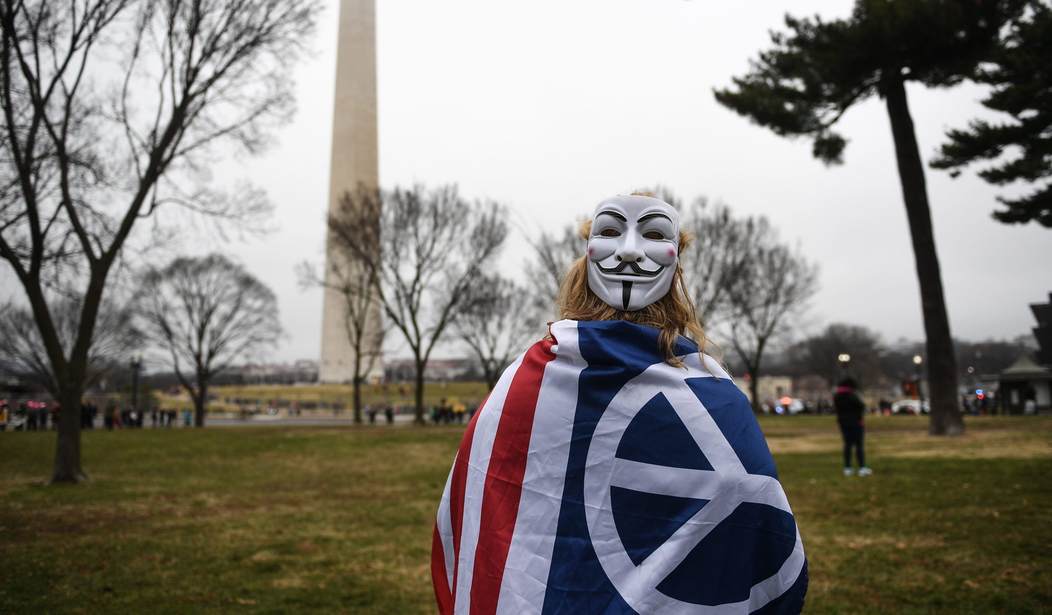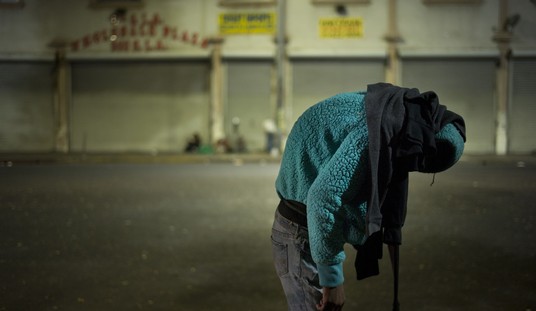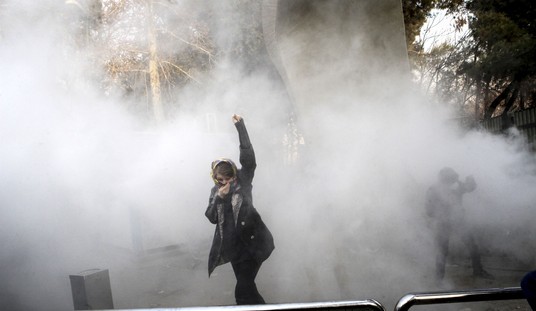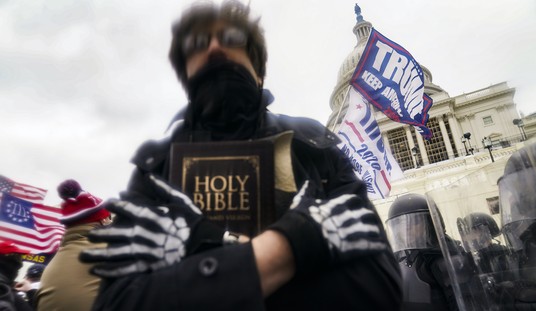In the struggle between Donald Trump and the 9th Circuit Court of Appeals, the president has both custom and the law on his side. Under the Constitution and the authority granted to past presidents by Congress, the chief executive has near-plenary power in matters of immigration, especially where national security is concerned.
Since 9/11, members of the Islamic ummah and their children have waged a low-level but unrelenting war against the American people, at Fort Hood, during the Boston Marathon and in San Bernardino and Orlando. Aside from the attacks on the World Trade Center and the Pentagon, the body count has been kept relatively low, in order to avoid triggering a full-fledged, perhaps terminal pushback against a recrudescent Islam now overflowing its cultural quarantine.
So the Left, which has effectively allied itself with Mohammedanism, in that they share a common enemy in the nation-as-foundation, has been free to indulge its standard communist tactics, including “protest” marches against the duly elected government of the United States, and the use of lawfare against our institutions, abetted by their allies within the institutions themselves. Wielding the worthy principles of the civil-rights movement as a club with which to render the nation effectively defenseless against illegal immigration (which is simply invasion minus heavy weaponry) and an influx of “refugees” from dysfunctional “countries” thousands of miles and oceans away, the Left has now laid its cards on the table.
Noted attorney Alan Dershowitz has some thoughts on Trump vs. the Ninth Circuit (the most overturned federal appellate court in the land, by the way):
President Donald Trump avoided a constitutional crisis by appealing, rather than defying, an overbroad injunction against his visa executive order issued by a federal judge in Washington State. A panel of the 9th Circuit Court of Appeals refused to rescind the injunction on an emergency basis, thus keeping the nationwide injunction in effect, at least until the court considers briefs from both sides. Another federal judge in Massachusetts rendered a decision refusing to renew a similar injunction, and thus allowing the visa restrictions to be implemented.
In light of these conflicting rulings, the President could have said that he was going to follow the one he and his lawyers believed was correct. Had he done so, the judge in Washington might well have held the President in contempt of court, thus creating a constitutional crisis between co-equal branches of our government.
Instead, Mr. Trump ordered his Justice Department immediately to appeal what he characterized as the “ridiculous” opinion of “this so-called judge,” as Mr. Trump characterized Justice James Robart on Twitter Saturday morning. The White House initially characterized the injunction as “outrageous,” but then withdrew that injudicious characterization, only to have the President tweet even more injudicious language that may well offend the Appellate Courts to which the order will be appealed.
Let’s stipulate that the Trump’s language was injudicious. And that, as a business executive, he’s unused to having his orders countermanded by subalterns. And that as a representative republic, we have a system of checks and balances among the three branches of government. But keep this in mind: like most fights in Washington, this is not about what it seems to be about. This is not really about an executive order being challenged by a state claiming “irreparable harm” over the content of that order. (What “irreparable harm,” one might ask.)
No, this is simply part of the “Resistance” to the lawfully elected president of the United States, the opening shots in a battle that will continue for the next four years, hamstringing the executive branch as much as possible in order to force Trump to fail on the very issues that got him elected.
Having said that, the injunction is too broad in scope and lacks nuance. It may well be modified on full appeal. It applies equally to individuals with different constitutional status. For example, a family from Yemen, with no connection to the U.S., has no cognizable right to receive a visa. Whereas, a visa holder already in this country might have such a right. But if the injunction is upheld, the President will have to comply with it, regardless of his personal views, or his lawyers’ professional judgments. As the Washington State Attorney General correctly put it, “No one is above the law, not even the President.”
That’s true, but irrelevant to the argument. The question before the Supreme Court (which needs to hear this case the minute Judge Gorsuch is confirmed) is whether the president’s Constitutional power in his capacity as commander-in-chief overrides the hurt feelings of people who have no innate legal right to be here. Visas can be, and often are, revoked. Illegals may and should be deported. And sworn enemies should never be allowed in, even if it sometimes means innocents must be discommoded in an attempt to sort them out from their co-religionists.
But the Left’s manipulation of “weaponized empathy” is tough to counteract. Since they operate on emotion rather than reason or principle — the only principle they understand is force, “by any means necessary” — they prey on the big-hearted and the soft-headed by elevating a particular instance into a general principle. They do it, for example, with abortion all the time, by parading a few pathetic cases before the public and then demanding, “Are you going to tell this woman she can’t/must, etc.” So it is with Trump’s “Muslim ban.” Are you going to tell this attractive — if imaginary — woman she’s not an American patriot?
The answer should be: of course, if true. But this is a propaganda image worthy of the old Soviet Union, and far better effected. To turn a symbol of the oppression of women and a dysfunctional culture antipathetic toward everything America and the West stand for into a “civil rights” issue has a kind of perverted genius about it; then again, they’ve been at it for a long time.
Although the executive and legislative branches are solidly in Republican hands, a single district court judge, representing the lowest level of the judicial branch, can bring a presidential order to a screeching halt – at least until and unless it is reversed or modified on appeal. And there is nothing the President can do about it, other than tweet his outrage and order an appeal to be taken to the Court of Appeals and eventually to the Supreme Court.
Never mind that Barack Hussein Obama flouted a federal judge’s ruling against Obamacare…
But because Republican Senators refused to allow former President Barack Obama to fill the vacancy resulting from Justice Scalia’s death a year ago, the High Court might well split 4-4 if this case comes before them, as the justices did when a case involving Mr. Obama’s executive order on deportation came to them from the federal courts in Texas. A 4-4 split leaves the lower court judgment intact.
But if the plaintiffs appeal the Massachusetts order, the Supreme Court may be presented with conflicting judgments. The 9th Circuit may affirm the granting of the nation-wide injunction, while the 1st Circuit affirms the denial of the injunction. A 4-4 split would leave both conflicting orders in place, thus causing uncertainty and even chaos. That is why the pending nomination of Neil Gorsuch – as the potential tie-breaking 9th Justice – is so important. But his nomination is unlikely to be approved by the Senate in time to decide this divisive issue, which appears to be on a fast track to the Supreme Court.
So we may have to live with the uncertainty resulting from an overbroad Executive Order, an overbroad injunction against that order, an overbroad refusal to enjoin any part of the order, and overbroad appeals from conflicting judicial decisions.
This is the strongest argument yet for nuking the filibuster for Supreme Court appointments, but because the GOP is saddled with the useless Mitch McConnell as Senate majority leader, the chances of that happening tout de suite are low. The party and the country would have been far better off had McConnell been defeated in his re-election bid in 2014, but here we are. Trump needs now to exert maximum pressure on a guy whose wife he just made secretary of transportation — a subtle quid pro quo. If McConnell bites the hand that feeds him, look for Chao to be gone asap.
So, for now, the Left has outmaneuvered a still-undermanned White House, which needs to learn from this as quickly as possible, before the next round of media-cheered lawfare begins on another front. Tactically, the White House needs to seize the narrative, push through its cabinet choices expeditiously, gets its new man on the Court and ram home the president’s message that this is a national-security issue by releasing as much intelligence as it can prudently muster.
The courts, especially the federal courts, have always been the Left’s best friends; the “progressives” see the courts as an easy shortcut around the messy business of democracy and representative governent, and why shouldn’t they? The Supreme Court has given them abortion and gay marriage. But should a lone federal judge be able to block a national-security order? The president doesn’t think so:
What is our country coming to when a judge can halt a Homeland Security travel ban and anyone, even with bad intentions, can come into U.S.?
— Donald J. Trump (@realDonaldTrump) February 4, 2017
Whichever side of the issue you come down, it’s a good question. That the Left won’t admit Trump has a valid point tells you all you need to know about them and their real intentions toward our country.
Follow me on Twitter @dkahanerules










Join the conversation as a VIP Member